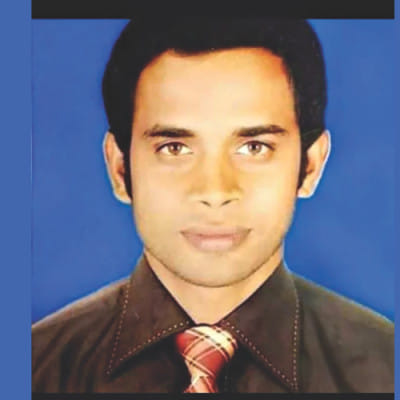Murder, not suicide

Twenty-three days after Asaduzzaman went missing, police recovered his body from an under-construction building in the city’s Basundhara area on July 11, 2017.
The victim, 33, was an accounts officer of PFI Properties Ltd, a developer company which was constructing the building.
Initially, police suspected it to be a case of suicide and an unnatural death case was filed with the local police.
Assaduzzaman’s family members, however, said he could never take his life. They said the soon-to-be-father had called his mother over phone on June 16, promising to visit their Natore home in two days to take his pregnant wife for delivery.
Shockingly, it took two years for the law enforcers and the family to know that the man was murdered and his body was hanged from the ceiling, apparently to confuse the investigators.
At the centre of this delay is a forensic doctor at Dhaka Medical College (DMC), who took too a long time to submit the autopsy report which confirmed Asaduzzaman was strangulated to death.
The sheer negligence in dispatching the report took place despite the High Court in May directed investigation officers to submit autopsy reports to the magistrates concerned within 10 days of any murder.
In Assaduzzaman’s case, police now believe the delay in receiving the report would make cracking the case more difficult. Crucial evidence could have been damaged or gone missing by now.
Talking to this correspondent recently, Aleya Begum, the victim’s mother, said, “I always believed that my son cannot commit suicide. Two days before he went missing, he told me that he would come home in a couple of days to be beside his pregnant wife.”
“How can a man who was so eagerly waiting to hug his baby kill himself?” asked the woman who is from Boroigram in Natore.
After the body was recovered, Bhatara police sent it to the DMC morgue for autopsy.
According to the autopsy report, a copy of which The Daily Star has obtained, Dr Sohel Mahmud, head of the DMC’s forensic medicine department, suggested a chemical examination be carried out on the body. Chemical examiners signed their report with remarks on July 19 in 2017.
Sohel then signed the report on August 1, 2017 where he wrote, “Considering the findings of the PM [post mortem] examination and chemical analysis report, my opinion on the cause of death of the victim was … asphyxia resulting from strangulation [ligature] which was ante-mortem and homicidal in nature.”
Despite the stunning discovery, the report only reached Bhatara police on September 15 this year, more than two years after it was prepared.
A staffer at the forensic medicine department, who used to dispatch autopsy reports, recently said they always send the reports on the very day they receive it from the doctors concerned.
Contacted on November 25, Sohel Mahmud initially said he could not recall the incident.
When given more details, he said, “Oh yes. That one. We had kept the report pending for the chemical investigation.”
Reminded that he had received the chemical examination report within a short time and even signed the autopsy report two years back, Sohel could not say for sure why there was a delay. He guessed the report may have gotten buried in the stack of files.
He also claimed that they had never delayed in delivering such reports.
Statistics obtained from the Dhaka Metropolitan Police, however, contradict his claims. According to the DMP’s data, investigation into 257 unnatural death cases filed six months or even longer ago with different police stations remain stalled as police are yet to receive autopsy report.
Of the cases, 51 were filed one year ago while two cases filed in 2015.
Asked about it, Sohel insisted dispatching autopsy reports based on police priority. “Despite manpower shortage and absence of proper remunerations, we always send [autopsy] reports quickly in all the important cases,” he told The Daily Star yesterday.
“Sometimes we can’t send the reports in time if the histopathological reports are not available.”
He also said on average eight to 10 autopsies are carried out daily at the DMC morgue, which has three forensic experts and two morgue assistants.
Dhaka Medical College Hospital is the largest public hospital in the country and the DMC morgue conducts 60 percent of the total autopsies done in the capital’s three hospital morgues, sources said.
Further doubts to Sohel’s version surfaced during conversations with Sheuly Begum, an aunt of victim Asaduzzaman, and Sub-Inspector Shaheen Mohammad Amanullah who is looking into the case.
Sheuly said she visited Sohel several times for a couple of months after the death and requested him to discharge the autopsy report quickly.
SI Amanullah, who sent the body to the morgue, said he himself visited the doctor several times for six months to get the autopsy report, but failed.
When Sohel was pressed about these visits, he did not deny that they took place, but would not say much about them.
“We submit reports immediately after getting them. I will look into the matter.”
DMP Additional Commissioner (crime) Krishna Pada Roy recently said, “It is easier to carry out investigation of a murder incident if we receive expert opinions quickly.”
He said delayed expert opinions make it difficult for police to corroborate circumstantial evidence with other findings.
A MURDER CASE FINALLY FILED
Sheuly Begum filed a murder case on September 16 against three named and several unknown accused over Assaduzzaman’s murder.
Investigation Officer of the case, SI Riyad Hossain, said they have already arrested the three named accused: Tajul Islam, Mehedi Hasan Miraz, and Shahidul Islam.
Tajul and Shahidul were staffers of the developer company where Asaduzzaman worked.
According to the case statement, Asaduzzaman used to live in a room of an under-construction building that his company was constructing in the capital’s Basundhara Residential Area.
His badly decomposed body was found hanging, 23 days after he went missing, on the sixth floor of the building.
Asaduzzaman had completed his Master’s degree from Tejgaon College before getting married.
Days before he was killed, his wife gave birth to a son, whose future seems bleak in the absence of his father. He is only two-and-a-half now.
Assaduzzaman’s mother Aleya Begum said she had to work in others’ homes to bear educational expenses of Asaduzzaman who was younger among two brothers. His elder brother has been suffering from kidney diseases and almost unable to work.
Aleya says she does not know when their wait for justice would end.

 For all latest news, follow The Daily Star's Google News channel.
For all latest news, follow The Daily Star's Google News channel. 



Comments